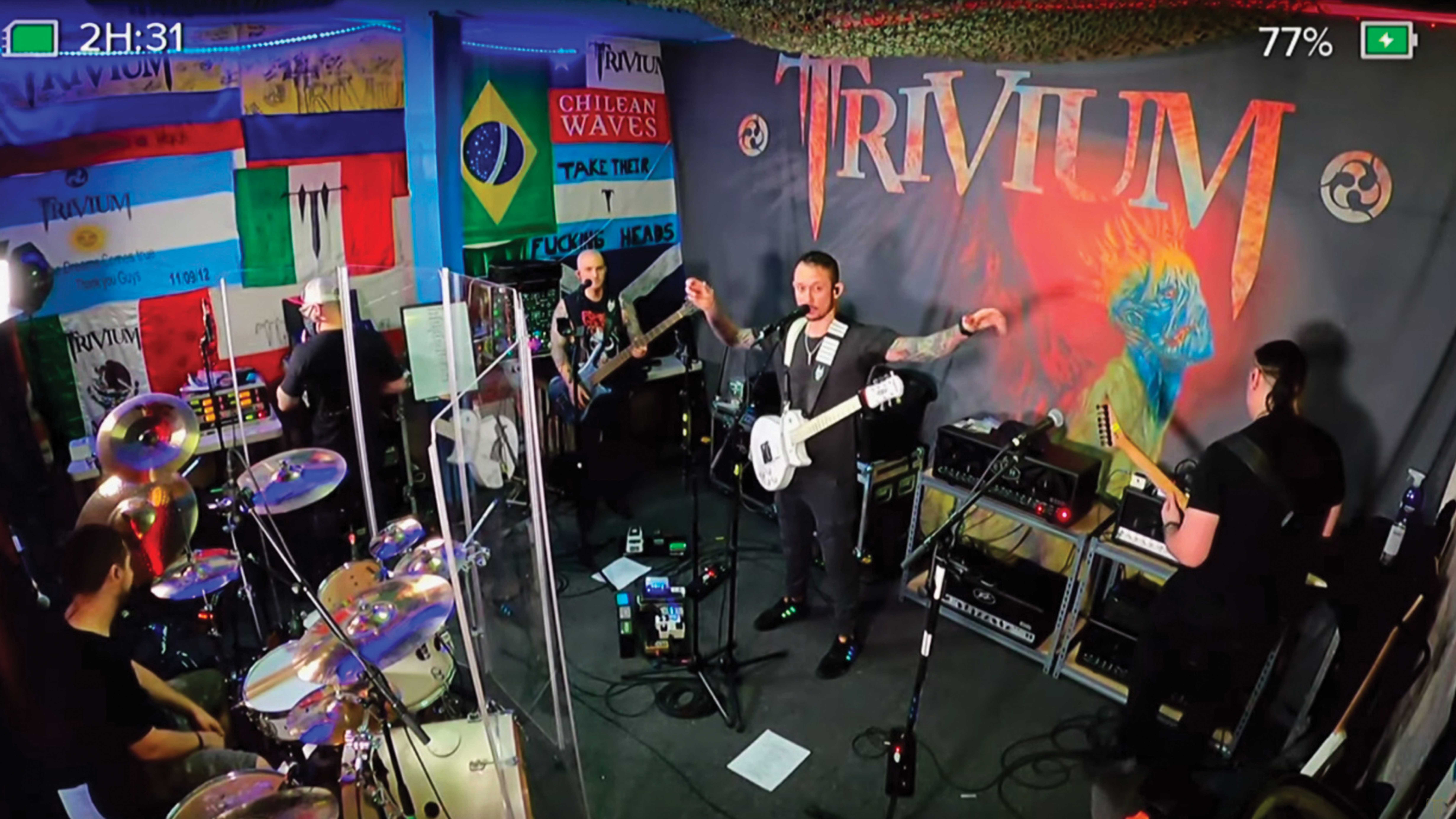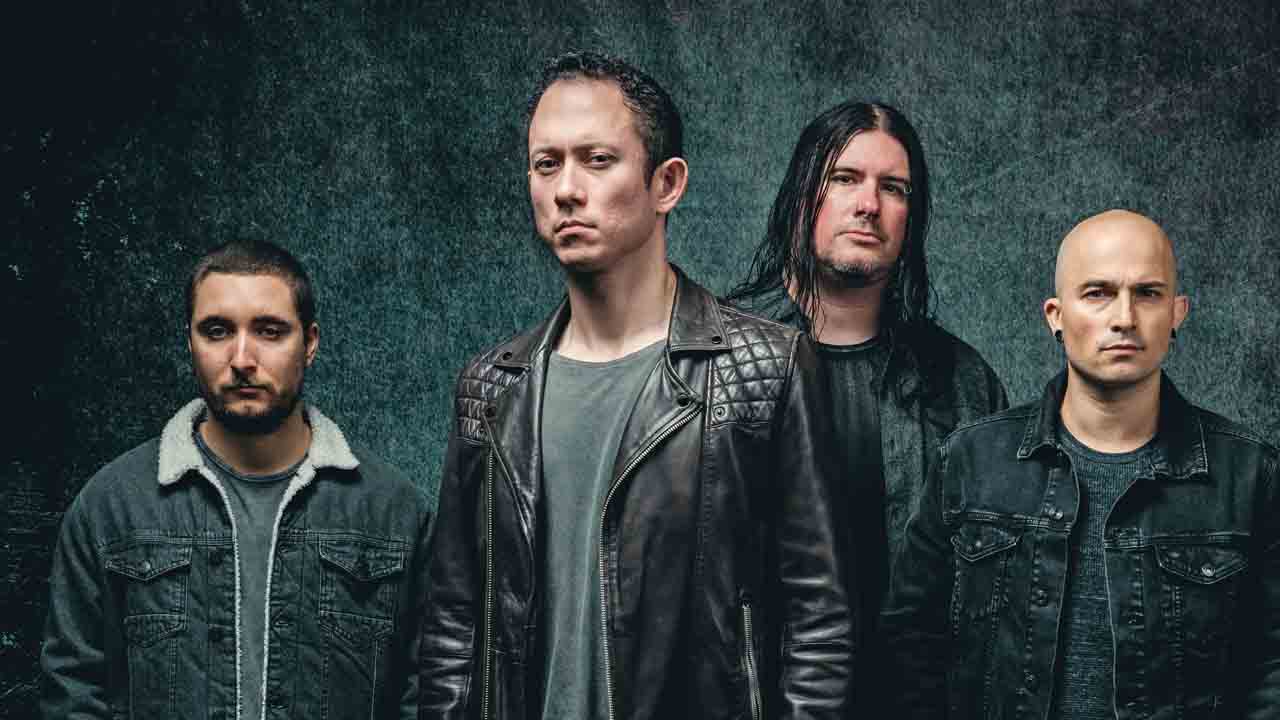At the start of 2020, Trivium had it all planned out. Their 2017 album, The Sin And The Sentence, had got them back on track after a few inconsistent years. Finally, the Floridian metallers were connecting with fans again in a way they hadn’t since they first set the world alight with their breakthrough second album, 2005’s Ascendancy. A packed schedule of press trips and tours looked to capitalise on that momentum. In March, they were due to head to Asia, before joining a huge tour that would see them criss-cross North America, playing arenas with Megadeth, Lamb Of God and In Flames. And in the midst of it all, they were set to drop their ninth record, What The Dead Men Say.
Then, of course, the shit hit the fan. As COVID-19 spread steadily across the world, Trivium regrouped and quickly decided that taking their foot off the gas was not an option. While the world went into lockdown, they took 2020 by the balls, ploughing ahead with the release of What The Dead Men Say – one of our year’s Top 10 albums – in April, and dominating the livestream landscape that emerged as the prospect of gigs went up in smoke.
We have to keep working to to stay alive
Matt Heafy
“If you look at the sizing of bands, Trivium is right in the middle,” says frontman and guitarist Matt Heafy. “Bands above us don’t have to do anything right now. They’re doing fine from their streaming numbers and previous royalties. We’re not that kind of band. We have to keep working to stay alive. So we were like, ‘Let’s see what we have in the bank. Let’s invest this in ourselves and our fans and create something special for them.’”
The result was A Light Or A Distant Mirror. Streamed in July, it was metal’s flagship virtual event of the year, and everything we’ve come to expect from metal’s slickest, most professional operators. Filmed at Florida’s Full Sail University, where lead guitarist Corey Beaulieu studied for his Recording Arts degree, the band brought in Sooner Routhier, the lighting director behind Muse, Kiss and Mötley Crüe’s eye-popping live shows, to run the same Wembley-sized production they had planned to take on the road with Megadeth. With ferocious support from Sylosis, the stream was watched by 12,000 people, setting the benchmark for what can be achieved remotely – and proving you don’t need an audience, or even an arena, to put on an arena-scale show.

“We were spending a lot of money to make this happen,” admits bassist Paolo Gregoletto, describing the thought process at the time. “We thought, ‘Are people really going to pay to watch this?’ That was the big thing for us; how much do you ask people to pay, especially when people are accustomed to watching stuff for free. It was a gamble, but our fanbase is very connected to what we do.”
Trivium weren’t the first band to take things online during the pandemic, but they were the first to prove streaming didn’t mean having to compromise on scope and vision, something Paolo thinks has inspired the rest of the scene. “I feel like bands would take what we did and push it even further,” he says. “Figuring out better ways to bundle tickets and merch or doing different experiences. I am proud that our band decided to do it early and tried to be as close to being first as possible. I hope that that gave people the confidence to go and be like, ‘We can do this. If Trivium can pull this off, we can too.’”
Saying that though, Trivium were in a better position than most bands when Coronavirus hit. Having signed up to livestreaming platform Twitch three years ago, Matt has built up a following of more than 185,000 subscribers, and while all four bandmembers now have their own channels, it’s Matt who is the most prolific. During the pandemic, a loyal audience has watched him game, exercise and play music three to six hours a day, five days a week. For the vocalist, it’s been a lifeline, not only keeping him sane and connected to the band’s fanbase, but also quite literally keeping the lights on. “My band isn’t making money if we’re not playing shows,” he says. “Streaming pulls in a little bit of money. It keeps the pot boiling but not overflowing, [it’s] kept my household alive.”
Have they been frustrated to see other metal bands getting praised for breaking new territory with streaming, when they’ve been doing it all this time? “Absolutely not,” says Matt. “It’s all about bringing more people over here. The more musicians that are able to stream and keep their bands afloat, the better. This is not a competition, everyone needs to rise up together. And if anyone is taking this as a competition, then they’ve got it completely wrong, especially in a time like now.”
When it came to following up A Light Or A Distant Mirror, the band kicked off a series of free Deepest Cuts shows in August, which were livestreamed on Matt’s Twitch channel. “Going on tour and feeding off the energy of the crowd is always such a great source of inspiration for writing the next album,” says Paolo. “I was bummed because we’re not going to have that. So what’s another way to become inspired? Let’s dive into that back catalogue and use these events as a creative spark.”
The sets saw them play tracks like Ascendancy’s Declaration, aired for the first time since 2007’s The Black Crusade tour, and songs that most fans probably thought they’d never hear live again. “From Vengeance Falls to The Sin And The Sentence was kind of a rocky period for us with having a couple of drummers come and go, and us still trying to experiment on record,” Paolo continues. “Going back to those songs and playing them again, we’ve realised how much cool stuff is on the records. Maybe because the reaction to them wasn’t what we were expecting, we looked away from them. You go back to it and you’re like, ‘Wow these are really great riffs.’”
Revisiting their vaults has been more fruitful than they’d imagined, but Trivium are also looking forward to the future, and, having put in the legwork this year, they’re heading into 2021 in a good place. The proceeds from A Light Or A Distant Mirror have gone towards buying a decommissioned aircraft hangar, which the band are in the process of transforming into their own HQ, a place where they can rehearse, record and continue streaming, an artform that the band think might well outlive the pandemic. “This is something that can really be beyond just the crisis,” says Paolo. “I think this has proven that bands always need to think about the possibility of, ‘What if touring isn’t happening this year for whatever reason?’”
And while the future is far from bulletproof, the bassist is confident metal will continue to survive anything COVID throws at it. “We’re a big, worldwide scene but we’re still always the outsiders,” he says enthusiastically. “We still have to depend on our fans to keep us going, and the fans have stepped up for so many bands.”

